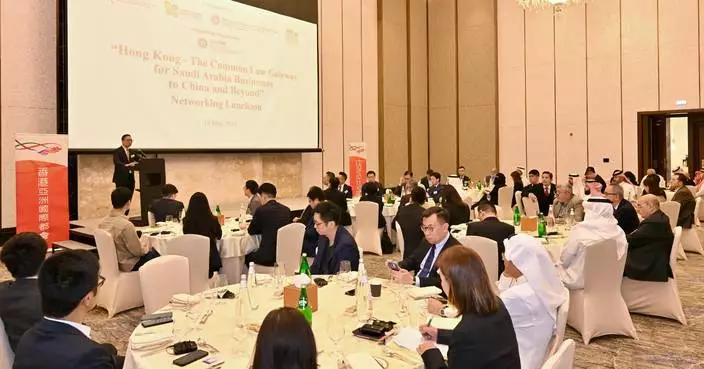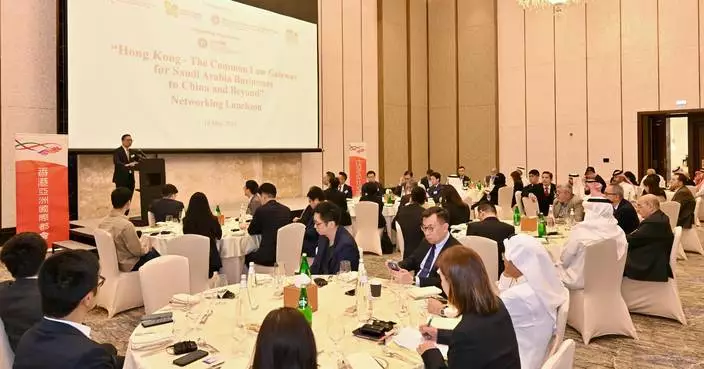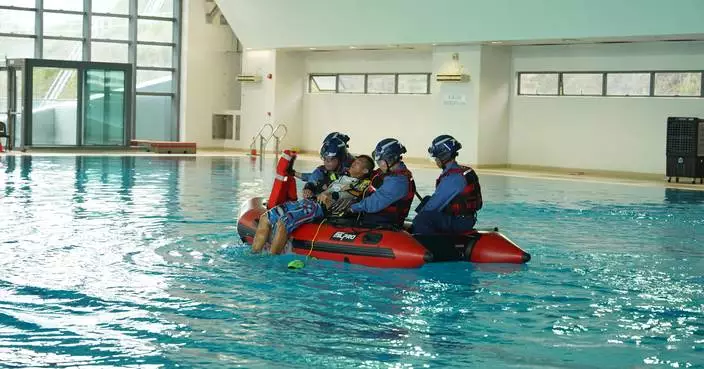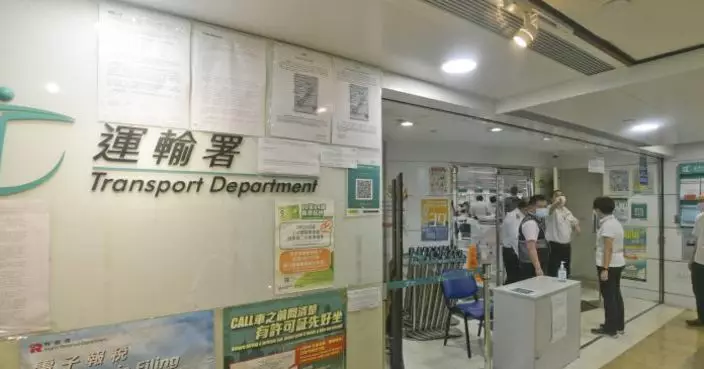Modernizing government services: a closer look at electronic service systems
Following is a question by Dr the Hon Lo Wai-kwok and a written reply by the Secretary for Innovation, Technology and Industry, Professor Sun Dong, in the Legislative Council today (May 8):
Question:
The 2023 Policy Address has announced the establishment of the Digital Policy Office (DPO) by merging the existing Office of the Government Chief Information Officer (OGCIO) and the Efficiency Office. On the other hand, it has been reported that recently, system launch failures occurred one after another for electronic service systems of the Government and public organisations (including the mobile applications "Check-in Smart (HKDSE)" and "i-Invigilation (HKDSE)" of the Hong Kong Examinations and Assessment Authority, as well as the intelligent sports and recreation services booking and information system "SmartPLAY" of the Leisure and Cultural Services Department), and the relevant organisations would usually explain afterwards that system failures were due to system overload caused by a login traffic far exceeding the expected level during testing. In this connection, will the Government inform this Council:
(1) whether the existing OGCIO or DPO to be established will, in the light of the expected number of users and the scale of different electronic service system projects of the Government and public organisations, improve the relevant practice guidelines and enhance monitoring by, for example, (i) requiring the contractors concerned to conduct various levels of load and extreme testing and even requiring the engagement of an independent third party for evaluation; (ii) including the past performance of contractors as one of the criteria for tender assessment; and (iii) specifying an incentive and penalty mechanism in the tenders; if so, of the details; if not, the reasons for that;
(2 )as there are views that with the progressive integration of cities in the Guangdong-Hong Kong-Macao Greater Bay Area (GBA), the development of the event economy in Hong Kong will induce more non-Hong Kong residents to register or purchase tickets for participation in various activities through electronic service systems of the Government, whether the authorities will consider commissioning the system contractors concerned to launch, in collaboration with large-scale electronic service providers in GBA, the relevant electronic service systems applicable in GBA, so as to achieve the complementarity of advantages; if so, of the details; if not, the reasons for that; and
(3) as there are views pointing out that the co-hosting of the 15th National Games by Guangdong, Hong Kong and Macao in 2025 will pose greater challenges to cross-boundary interconnectivity in the flow of people, goods, capital and information amongst the three places, and the relevant government electronic service systems (including ticketing systems) must measure up to higher requirements, whether the authorities will expeditiously step up communication and collaboration with the relevant Mainland and Macao authorities and formulate plans to cope with the situation in case of failures of the relevant systems; if so, of the details; if not, the reasons for that?
Reply:
President,
Having consulted the Culture, Sports and Tourism Bureau (CSTB), my reply to the three parts of the question is as follows:
(1) The government information technology (IT) projects mainly serve to meet the service needs of individual departments. Hence, these IT projects are spearheaded by responsible bureaux and departments (B/Ds) to ensure that the development and operation of the systems cater for respective B/Ds' policies and the needs of their public service recipients. To instil greater public confidence in the Government's implementation of digital services, the Office of the Government Chief Information Officer (OGCIO) has since end-2023 strengthened its support to the B/Ds in respect of their governance of IT projects at different levels, by enhancing the departments' risk management mechanism concerning the initiation, development and rollout of the electronic service systems, in order to further improve the stability and security of e-government systems. The support measures include requiring the B/Ds to raise the weighting of technical assessments in tender marking schemes to 70 per cent when procuring system development services for large-scale or high-risk IT projects, and to conduct third-party independent test before launching electronic services to assess system resilience to abnormal or extreme loading as well as cyberattacks.
The recent hiccups in the performance of IT systems upon rollout by individual public bodies show that besides government departments, public bodies must also plan carefully and conduct sufficient testing before launching public-facing electronic services to ensure the secure and stable operation of the system. The OGCIO is actively examining appropriate guidelines and technical support to the B/Ds to strengthen their governance of new IT systems launched by public bodies within their purview, including adequate testing before system rollout.
We are seeking the views and necessary approval of the Legislative Council on the establishment of the Digital Policy Office, which is expected to be in place in mid-2024. This office will continue to undertake the existing functions and work of the OGCIO, including the above-mentioned support to the B/Ds in the governance of their own IT systems projects as well as those of the public bodies under their policy oversight. It will also strengthen its function to steer and guide the B/Ds in responding to the needs and expectations of society in an appropriate manner as we take forward implementation of electronic government services.
(2) According to information provided by the CSTB, there are at present different service systems in the local market, such as the Urban Ticketing System (URBTIX) operated by the Leisure and Cultural Services Department and some privately-run systems, for event organisers to select the suitable ticketing arrangement in light of their programmes, activities and sales strategies. The URBTIX provides a wide range of ticketing channels (including box offices and self-service kiosks, booking hotlines and 24-hour online and mobile application ticketing services) and a variety of electronic payment methods (including credit card, debit card, UnionPay card, Octopus, Alipay, WeChat Pay and the Faster Payment System) to facilitate purchase of ticket by the public and tourists, including tourists from Mainland cities in the Greater Bay Area. Tourists from different places can opt for ticket delivery to the Mainland and overseas, or collect them at the URBTIX box offices/self-service kiosks before the performance, after purchasing the tickets online or through mobile application of URBTIX. E-tickets are also available for individual programmes. Some organisers of programmes held in Hong Kong also choose to sell tickets through Mainland sales channels, including online ticketing systems and travel websites.
In addition, to further enhance convenience to Mainland visitors who use our government services, the 2023 Policy Address has set the indicator to provide an option for making payment by Mainland e-wallets for government services commonly used by Mainland visitors (including booking of various leisure facilities) by the third quarter of 2024. This measure will facilitate Mainland residents' purchase of tickets for programmes or activities including different mega events through relevant government electronic systems.
(3) The Government attaches great importance to the preparatory work in Hong Kong for the 15th National Games, the 12th National Games for Persons with Disabilities and the 9th National Special Olympic Games. On the part concerning the IT systems of the Games, the National Games Coordination Office (Hong Kong) of the CSTB has already started discussions about the work involved with the General Administration of Sport of China (GASC) and the concerned authorities of Guangdong Province and Macao in collaboration with the OGCIO. We will formulate practical and feasible implementation plans with regard to the requirements set out in the overall IT plan of the GASC and the actual situation in Hong Kong. We will also arrange system testing in due course, with a view to ensuring that the IT systems and electronic services of the Games, including the network and communication system, competition information system, event management system, etc., will operate smoothly.

Source: AI-generated images
Unlocking opportunities: how hong kong's common law can propel saudi businesses into the chinese market and beyond
Following is the speech by the Secretary for Justice, Mr Paul Lam, SC, at the lunch and networking reception titled "Hong Kong - The Common Law Gateway for Saudi Arabia Businesses to China and Beyond" in Riyadh, Saudi Arabia, today (May 19, Riyadh time):
Distinguished guests, ladies and gentlemen,
Firstly I would like to express my gratitude and to welcome all of you to this networking luncheon organised by the Department of Justice together with other organisations as the MC has just said. I wish just to take the opportunity to say a few things to explain why we are here and what we need to achieve. But let me begin by making one very important point: today's lunch has a very special meaning to me and to my delegation from Hong Kong because there are many "firsts".
This is the first time I lead a delegation consisting of lawyers and members from other business sectors on an overseas trip after I became the Secretary for Justice in July 2022. This is the first "first". The second "first" is that as to this particular trip to the Middle East, Saudi Arabia is our first destination. So that our first destination is the second "first". The third "first" is that we just arrived this morning around 3am, some arrived a little later at 4am or 5am. And this particular lunch is in fact the first event for the whole trip including that in Saudi Arabia. So it is going to be very memorable. As there is a Chinese saying, because we have a lot of friends coming from the Mainland China, a good beginning means 50 per cent of your success. So I am truly very honoured and very pleased to see so many guests from Saudi Arabia and also representatives of enterprises, organisations from Mainland China in Saudi Arabia and to come here to join this lunch.
Now coming to the purpose of this lunch, and perhaps this trip. Obviously, as the minister of justice of Hong Kong, I am trying to tell you a little bit more about the legal service in Hong Kong, what we can offer, but, more importantly, we have to start by making friends. We have to start by building personal relationship. In order to build a personal relationship, the very first thing we need to do is to introduce ourselves.
My delegation consists of, I don't remember the exact number, but probably maybe around 40 including all my supporting staff. Now the combination is quite unique. Firstly, we have people coming from the Government, not just from the Department of Justice in which I am working, I am joined by representatives of Invest Hong Kong which is a branch of the Government responsible for promoting investment, colleagues coming from the ETO (Hong Kong Economic and Trade Office) all the way from Dubai, for they are responsible for promoting trade around the world. And then we have representatives from the Hong Kong Trade Development Council which is a statutory body also responsible for promoting trade. So we have numerous organisations trying to work together to enhance Hong Kong's relationship with other jurisdictions.
Apart from representatives coming from the Government, we have very strong representatives from the private sector. We have more than around say 15 lawyers who are really the top lawyers in Hong Kong. They specialise in doing both contentious and also non-contention business. We have experts doing IPOs (initial public offerings), M&A (mergers and acquisitions), and we also have experts in arbitration or litigation. So we have whole spectrum of legal eagles in this room. And on top of that, I have also invited representatives from the Hong Kong Stock Exchange and Hong Kong International Arbitration Centre to be here.
Now you may wonder why instead of simply asking my colleagues to come here, which is much easier to organise this trip, why I have invited so many friends to come here. The reason is very simple, because I wish to demonstrate to people, our friends in Saudi Arabia, that Hong Kong is really an ideal place to provide one-stop professional legal service from the time you think of setting up a business in Hong Kong for exploring opportunities in Mainland China, up to the very end when unfortunately some disputes arise, and then you have to consider where and how to resolve the disputes. We offer a sort of packaged professional services from the very beginning until the very end. And the representatives of this delegation, they are experts at different stages of these whole business cycle, so to speak.
Now, maybe you have noticed that we have a theme for the talk, and in fact, that is also the theme I am going to use throughout my trip. It goes something like "Hong Kong - The Common Law Gateway for Saudi Arabia Businesses to China and Beyond". I think "gateway" simply symbolised the fact that Hong Kong is playing a very important role of connecting Saudi Arabia and the Middle East with not just Hong Kong itself. Hong Kong is not just a destination, it is also a springboard or place that can take you to other parts of China so that you can explore opportunities in the whole country.
Now, what is perhaps a little bit unusual is that I have deliberately add the word "common law" before the word "gateway". And here comes the important point, because as the person responsible for promoting legal services in Hong Kong, this is really the point that I wish to emphasise at this lunch. Now, why is this so important? Why is it of interest to friends in Saudi Arabia?
To answer the question, perhaps I have to step back and talk a little bit about the history of Hong Kong. I am sure most of you would be aware of what I am going to say, but it is worth repeating now. I am sure that those of you would be aware of the fact that Hong Kong used to be ruled by the British for more than 100 years between 1842 until June 30, 1997. Now, the important thing is that during this period of British rule, the British introduced the common law system to Hong Kong and that common law system developing for a century has become extremely reputable and well-established. And what happened on July 1, 1997 is that China resumed sovereignty of Hong Kong. China decided to resume sovereignty in a very unique manner which was unprecedented in human history, that is by introducing the concept or principle of "one country, two systems", which means that Hong Kong shall maintain and preserve its common law system. So we are still using the common law system in Hong Kong, which is entirely different from the civil law system used in other parts of China.
You may then ask: why is the common law system so significant? How is it relevant to your business or investment interests? Now, I wish to highlight four important characteristics perhaps we ought to bear in mind.
The first characteristic that I wish to stress is that we have a very trustworthy, very credible, very reliable and reputable judicial system. Under the mini-constitution of Hong Kong, which is called the Basic Law of Hong Kong, the courts of Hong Kong enjoy independent power of adjudication, including the Court of Final Appeal in the power of final adjudication. That means in every litigation of court proceedings in Hong Kong, it always ends in Hong Kong, it never goes beyond Hong Kong.
And a very special feature that is also worth mentioning is that in our Court of Final Appeal, which is the highest court in Hong Kong, we have invited at the moment 10 overseas judges, very eminent retired judges from other jurisdictions, to sit as our part time judges. A very recent appointment is a retired federal judge from Australia. We also have retired judges from England, from Australia, from Canada. Before their retirement, they used to be the chief justice of their respective jurisdiction. And I think that firstly it is a vote of confidence of judges from other jurisdictions in the legal system of Hong Kong. And secondly, it is a symbol and the indication of the quality of justice that the Hong Kong judicial system can offer. So this is my first point.
The second point is that the Hong Kong legal system offers a very secure and safe regulatory system to safeguard your financial interests. Under our Basic Law, which a constitutional document, we guarantee private property right. So no one can expropriate your property, not even the government under no circumstances can they take away your property at their own discretion. And then free flow of capital is guaranteed. Money can come in Hong Kong and leave Hong Kong freely. So it is a very, very friendly environment for funds to move in and to move out. But at the same time, we also have a very strict regulatory framework to ensure that misconduct or malpractices will not be permitted. So this is to strike a balance to ensure free flow of capital and at the same time to ensure that your money, your investments and financial interests will be sufficiently protected.
The other thing is that when it comes to law enforcement, Hong Kong is regarded as one of the cleanest place in Hong Kong. So corruption or other sort of malpractice that might exist in some other places in the world is not an issue in Hong Kong. So putting aside a similar framework in practice, it's applied and enforced very straightly and properly.
So then go to my third point. My third point is that our legal system is extremely business friendly. Business friendly in the sense that the content of our law is extremely similar to the civil and commercial law that we found in most other countries, in particular in the western world, say the United States and the UK and western Europe. And the simple reason is because of the common law tradition that I have mentioned. Most of our civil and commercial law, for example company law and contract law, the content is almost identical to what you may have in England, Australia and New Zealand. So the important thing is that our set of law is extremely familiar to the international business community. But at the same time, apart from maintaining our tradition, we try to ensure that our law will be updated to meet the new demands. So very recently we have introduced a new legislation to encourage people to set up, for example, family office in Hong Kong by providing tax advantages. And there are also other measures to ensure that we can provide a very attractive environment at the same time to give you the sort of protection that you deserve. Ms Alpha Lau, the Director-General of Invest Hong Kong, is going to speak after me. I am sure that she can provide more details in this respect.
But apart from the substantive law, what is equally important is that we have a very strong pool of legal talent in Hong Kong. I mentioned earlier that more than 15 lawyers come with me and that by itself is an evidence on the strength of the legal profession. We have a divided legal profession in Hong Kong consisting of barristers and solicitors. Barristers are specialists in doing contentious business. They go to court most of the time, they also take part in arbitration and mediation. And then the solicitors, they are more general in practice. They will be responsible for non-contentious matters, say M&A, IPO, providing advisory work, so on and so forth. So what I wish to emphasise is that we have a big pool of top-quality professionals who stand ready to serve your interests. And one thing that we must bear in mind is that most of these legal professionals are bilingual, many of us are Chinese, of course we have a lot of expatriates. Because of the unique situation in Hong Kong, apart from being very familiar with the international legal community, we are also extremely familiar with how things are done in Mainland China, both the culture and the business environment. So I think that is also an advantage that would work in your interests.
Now the fourth point that I would like to mention about our legal system is that it provides very close connection to both Mainland China and other parts of the world. Now firstly, in particular, I would like to speak on how Hong Kong's legal system is connected to the Mainland because this is a feature that cannot be copied or found elsewhere. I said earlier on that under the principle of "one country, two systems", Hong Kong's legal system is different or separate from that of the Mainland, but it doesn't mean that there is no connection between the two legal systems within the same country. Quite the contrary, we have at the moment nine mutual legal assistance arrangements that connect the two jurisdictions together. And these connections, based on the mutual legal assistance agreements are of great significance to safeguard the interest of investors and businessmen from overseas. I can give you a very simple example. Based on some of the arrangements that I mentioned, a court judgment in Hong Kong for an arbitral award in Hong Kong can be recognised and enforced in the Mainland. So if your business partner is in Mainland China, your assets there that you have to protect, but you wish to take advantage of Hong Kong legal system because you have confidence in our legal system, then Hong Kong is the right choice. You can use our legal system, but you can enjoy the fruit of success of the legal process in Mainland China. Now these legal arrangements are unique to Hong Kong. It is only made possible because of the "one country, two systems" arrangement. So if you go to places like, just as an example Singapore or other places, then you will not find exactly this same sort of co-operation, arrangement or convenience.
So putting these four characteristics together, I would have thought that you will be convinced to a certain degree that Hong Kong is definitely a place for you to consider to act as a platform, a connector, a springboard for you to go into the market in Mainland China and beyond. I said "beyond" because we are all aware of the development and relationship between Middle East and China, including in particular the relationship between Saudi Arabia and China. We have very long friendship going back for more than 1 000 years. Of course I am referring to the Silk Road. But I note that in June 2023, last year, your investment minister said in a very important conference that there would be a modern silk road between Arab countries, including of course, Saudi Arabia, and China. So "silk road" is not something belonging to history. It is not about the past. It is also about our common future. So Hong Kong plays a very significant role in fostering a better relationship between the two countries because of the unique characteristics offered by "one country, two systems".
And as you may note, last February the Chief Executive of Hong Kong came here with a strong delegation, I remember it's almost 100 persons from different sectors. A lot of agreements have been signed, and a lot of initiatives. And after that, many colleagues from the Government in different areas have come to Saudi Arabia. So it is now my turn, basically. And we are talking about setting up an ETO, economic and trade office, in Saudi Arabia in Riyadh. I hope it will come into reality soon. But the future is very clear, the direction is very clear. I am very confident and I hope that you are equally confident that the relationship between Saudi Arabia and Hong Kong is going to be very strong and much closer than today. But it requires some efforts. So I am sure that each and every one of us in this room can make some contributions to make what we have in mind to come true as soon as possible. It is a bit a pity that we only have about two hours or so at this lunch to make friends, to talk about things of common interests. It may be a very small step in the overall scheme of things, but I do believe that this is the small step that will take us closer to our final destination.
So lastly, I wish you all a very enjoyable lunch. I hope we can make some friends and enhance our relationship. If you have any question on Hong Kong, I am sure that my friends from Hong Kong sitting at the table will be more than happy to entertain all the questions. And I am very confident that they will have good answers. And obviously, we are also very interested to hear from you about your situation in Saudi Arabia. I think to make friends, we have to know each other first. So thank you very much.

Speech by SJ at lunch and networking reception titled "Hong Kong - The Common Law Gateway for Saudi Arabia Businesses to China and Beyond" in Riyadh, Saudi Arabia Source: HKSAR Government Press Releases










